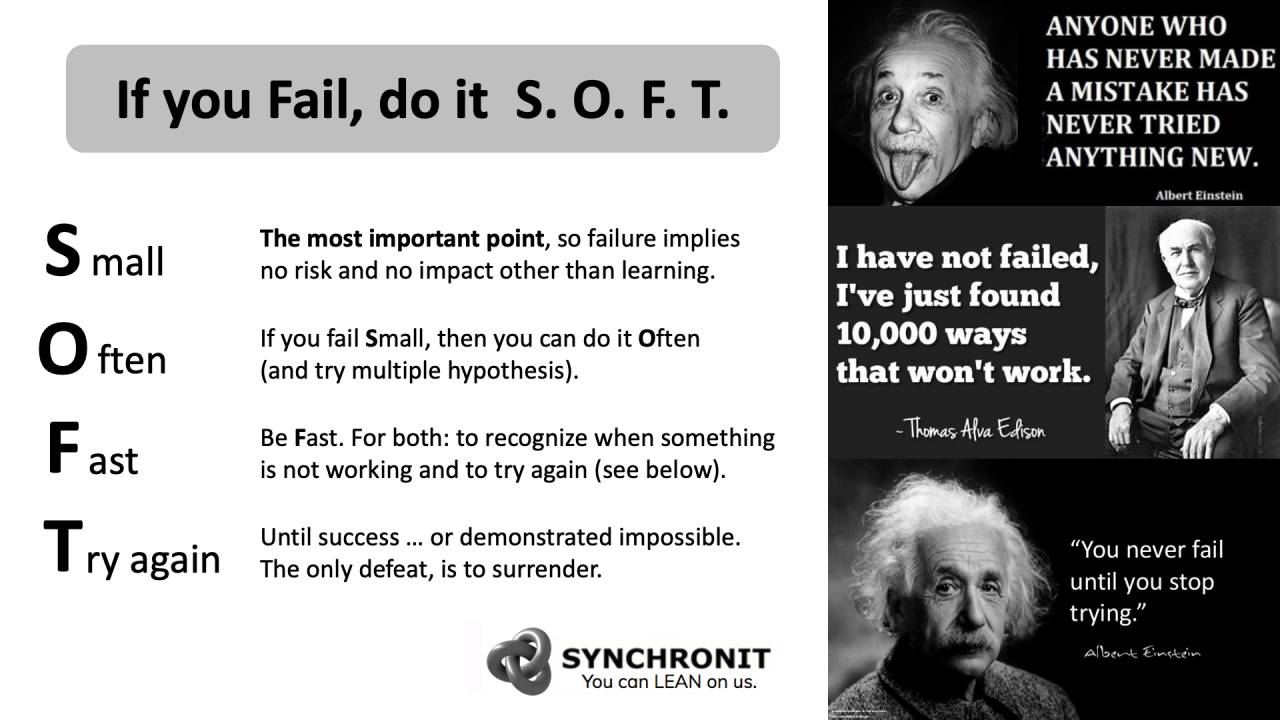
If you Fail, do it S. O. F. T.
Let's be clear from the beginning: Failure is not a Goal.
I have seen teams celebrating failure and saying "We are learning!" But the truth is that you can only say that you are learning when you stop repeating the same mistakes. And yet, this is not enough. If you push the wrong button and launch nuclear missiles, it doesn't help that "now you learned" and you won't repeat the same mistake. Let's look a bit deeper.
In the old mass-production mindset, failure has always been a problem.
When organizations are conceived like a big machinery and each individual is just a piece in it (i.e. a "resource" performing a limited function) bad results are often considered the consequence of a defective part and are a reason to fire somebody. It makes sense in this schema, to replace "the failing part" by a better "cog" in the machinery. Some bad managers even use "fuse management" to save their necks, having always somebody "fireable" to blame, before it comes to them.
But in Lean, failure has a different nature. Problems are seen from a systemic point of view.
Since roles are not so precisely defined, individuals are not constrained to use just some part of their abilities. Responsibilities are assumed at team level. Mistakes are not individual but collective. The only mistake that cannot be forgiven, is to hide one. And you don't need to hide it, because it is not yours, but ours, and the sooner we are aware of it, the better. So, do not hide problems (yes, you can even call "problem" a problem). The team will be thankful that you noticed it sooner rather than later.
Mass Production has been all about planning and execution. "A customer can have a car any color, as long as it is black", Henry Ford dixit. Cars were all the same (not only the color) and each copy had a value. It didn't matter that you were always doing the same thing. That was part of the paradigm and that is also why there was no tolerance for errors. You do the same job again and again, every single day.
But in order to face the dynamics of today's reality, this approach doesn't work anymore. After all, another concept that changes from Mass Production to Lean, is "perfection". We are not making copies anymore, so the perfect copy becomes an outdated concept. More important than being perfect, is to constantly get better.

And to get better and deal with uncertainty, you need to run experiments.

And why do we run experiments? Simple: to validate hypothesis.
Eric Ries stressed the importance of this point that Science is repeating since a long time ago and even put it on different words: validate learning.
Since hypothesis can be right or wrong, you have to check them and be prepared to fail.
But like a ball being pressed under the water that once released jumps up on the air instead of reaching the balance at the flotation level, we have overreacted. More than once, teams have celebrated failure with the pretext that "we are learning!!".
Failure is not something to celebrate.
Fail fast. Fail often. And more similar statements have been spread in Agile / Lean communities. They are right. But we have forgotten one of the most important aspects of any experiment: do it in small scale.
If failure is an option, you do not want to do it in large. You want to fail Small.
Indeed, when you work Lean / Agile, there is no room for big failures. You do things incrementally and each increment is only big enough, as long as you have a reasonable certainty of success. Otherwise, you scale down. You slice the elephant.
This is why the "S" (small) is the most important point. Because if you fail Small, then you can fail Often. You can try multiple hypothesis simultaneously. You can delay decisions, experiment and decide based on evidence.
Once you take a scientific approach, be ready also to leave out those hypothesis not confirmed. It doesn't matter how much you thought they should have worked. Try to learn why, how, all related variables and elaborate a new hypothesis. But regarding the original one, you better move Fast and have no delay in recognizing when something is not working and also move Fast to try something new, a better hypothesis.
The cycle is then closed once you Try again.
Every experiment should lead to success (the goal) or to a failure out of which you can learn how to refine your next experiment and reduce the universe of possible solutions.
That's it. So ... if you fail, do it Small, Often, Fast and Try again. Do it S.O.F.T.

